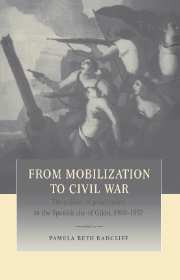Book contents
- Frontmatter
- Contents
- List of maps
- List of tables
- Acknowledgments
- Glossary of terms and abbreviations
- Introduction
- 1 A turning point: the city in 1900
- PART I Patterns of life in working-class Gijón
- PART II Institutional forces of opposition: republicans and anarchosyndicalists
- 4 The republican parties and municipal politics, 1900–1930
- 5 The republicans in power: municipal politics, 1931–1936
- 6 The trade union movement, 1900–1936
- PART III Defining an oppositional culture: the struggle over the public sphere
- PART IV The urban battlefield: conflict and collective action, 1901–1936
- Conclusion
- Appendix 1 Wage and price movement
- Appendix 2 Occupations by status category
- Appendix 3 Supplementary tables
- Select bibliography
- Index
4 - The republican parties and municipal politics, 1900–1930
Published online by Cambridge University Press: 31 October 2009
- Frontmatter
- Contents
- List of maps
- List of tables
- Acknowledgments
- Glossary of terms and abbreviations
- Introduction
- 1 A turning point: the city in 1900
- PART I Patterns of life in working-class Gijón
- PART II Institutional forces of opposition: republicans and anarchosyndicalists
- 4 The republican parties and municipal politics, 1900–1930
- 5 The republicans in power: municipal politics, 1931–1936
- 6 The trade union movement, 1900–1936
- PART III Defining an oppositional culture: the struggle over the public sphere
- PART IV The urban battlefield: conflict and collective action, 1901–1936
- Conclusion
- Appendix 1 Wage and price movement
- Appendix 2 Occupations by status category
- Appendix 3 Supplementary tables
- Select bibliography
- Index
Summary
In July of 1910, the anarchist Marcelino Suárez attempted to assassinate the president of the Employers' Association, Domingo Orueta, driven to it, as he testified, by the crimes of the employers and their lackeys. Although he failed, the event provoked the most dramatic political polarization of the city since the 1901 general strike. In response to a hysterical Conservative crusade to establish law and order, crush the trade unions and replace the elected republican city council with a commission of “honorable citizens,” a left alliance of the besieged groups solidified. At the heart of the coalition were the republican councilors, now in the majority, who defended the right of workers to organize, protested against the random arrests of union leaders and resisted the attempted coup by the city's financial elite. The contrast between the behavior of the old Conservative governments and the new republican-dominated city council could not have been more dramatic. The power of this left coalition seemed to augur a new era in local politics, with the republicans poised to lead the political assault on the old regime.
As the story demonstrates, the republicans had moved from the margin to the center of local politics in less than a decade. By 1909, when they captured a majority on the city council, the republican movement established itself as the most formidable opposition to the Restoration regime. Nevertheless, they had a difficult time capitalizing on this victory. From 1909 to 1923, when parliamentary politics were suspended, a series of republican city councils struggled to differentiate themselves from the Conservative era, but few concrete results backed them up.
- Type
- Chapter
- Information
- From Mobilization to Civil WarThe Politics of Polarization in the Spanish City of Gijón, 1900–1937, pp. 118 - 141Publisher: Cambridge University PressPrint publication year: 1997



